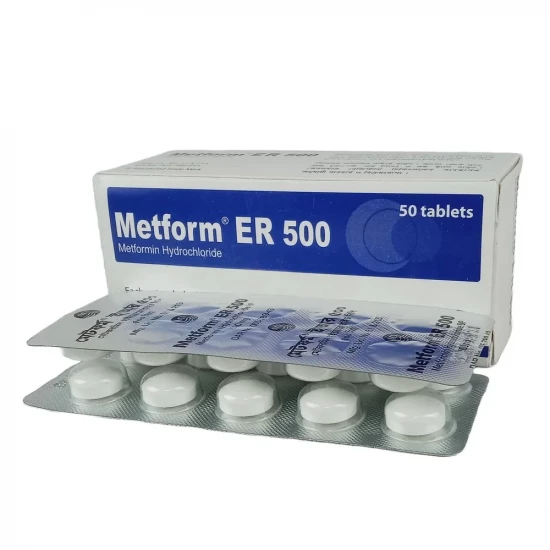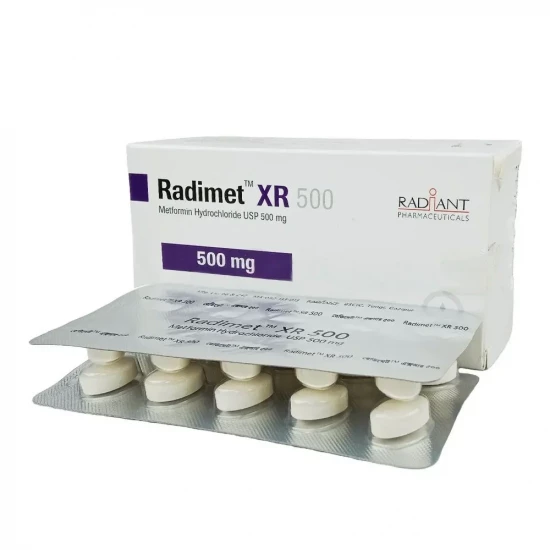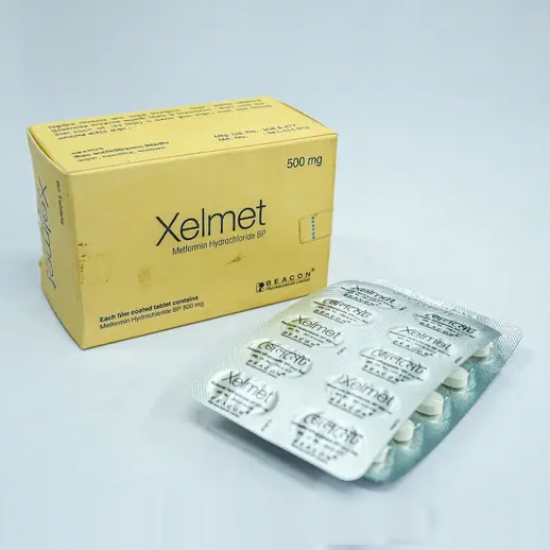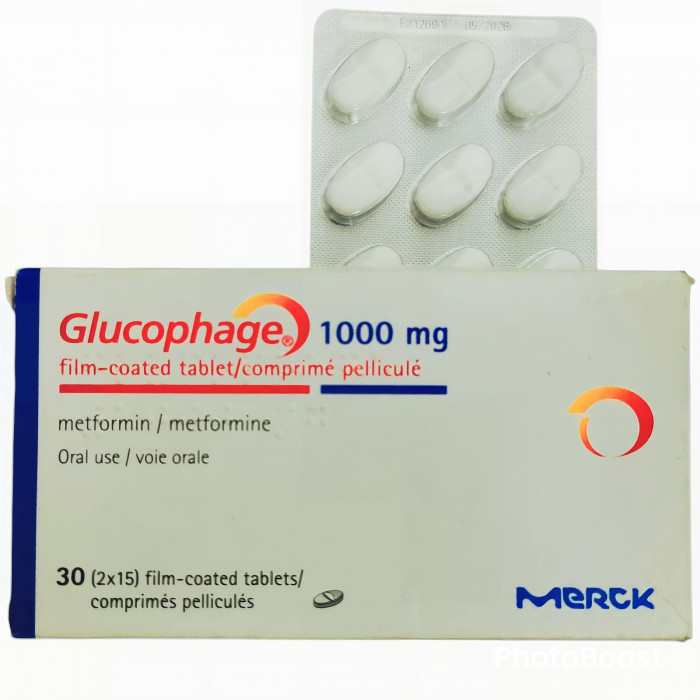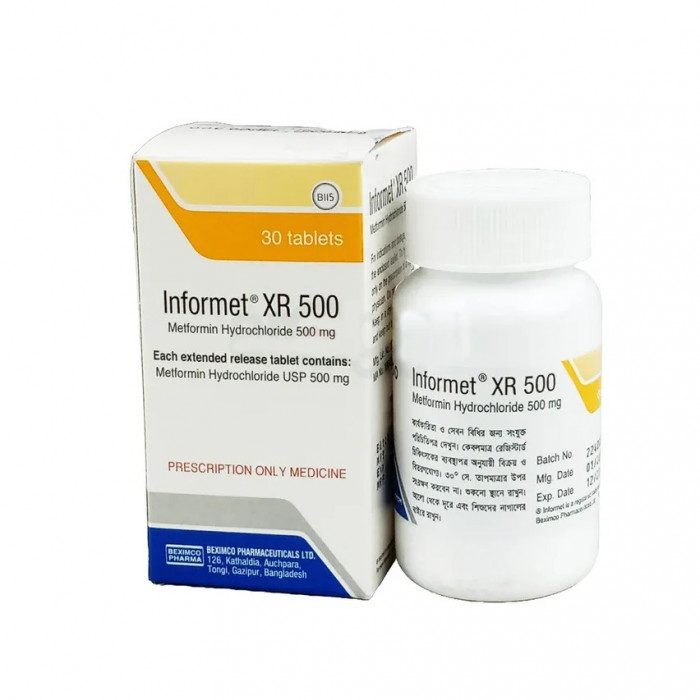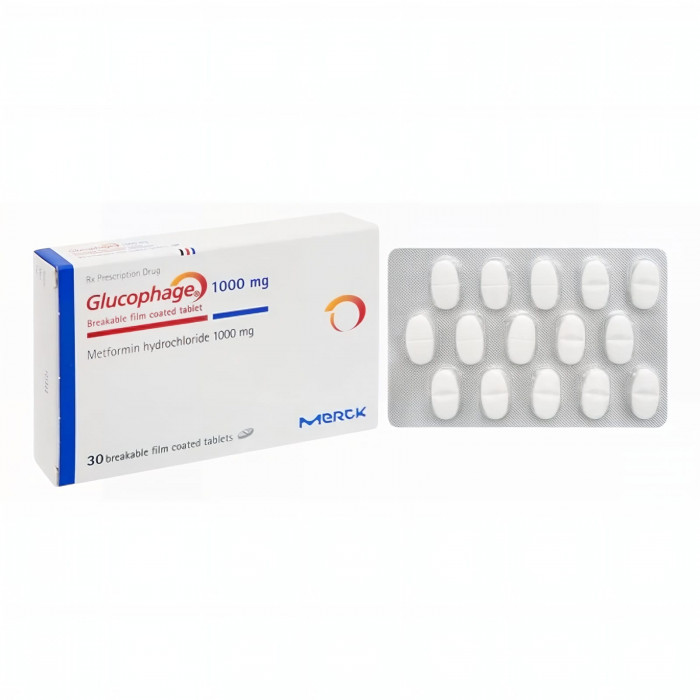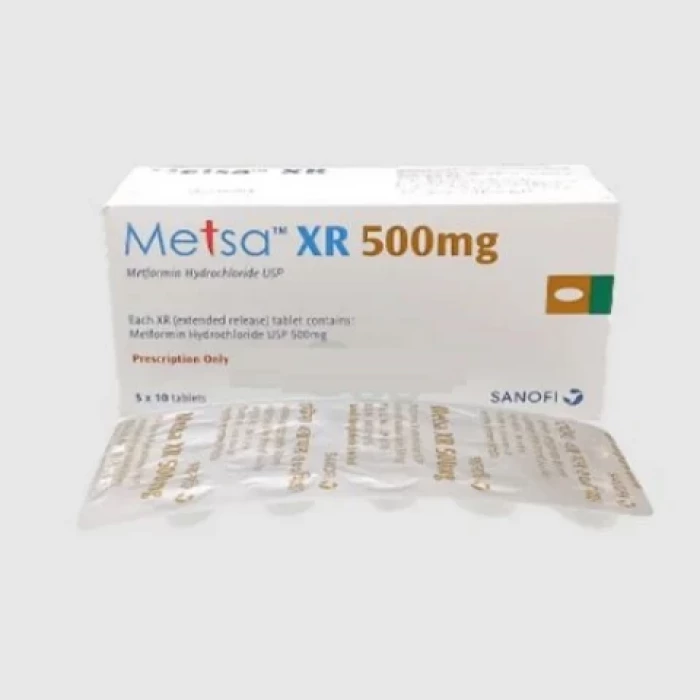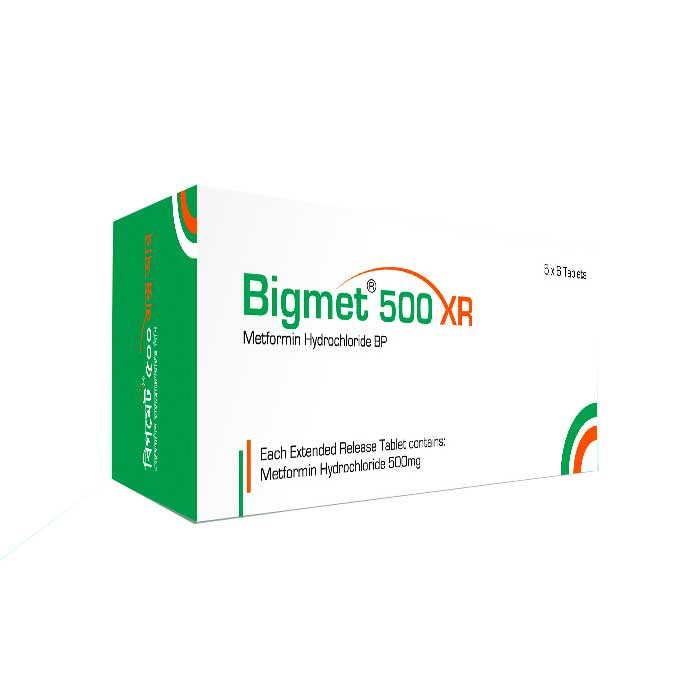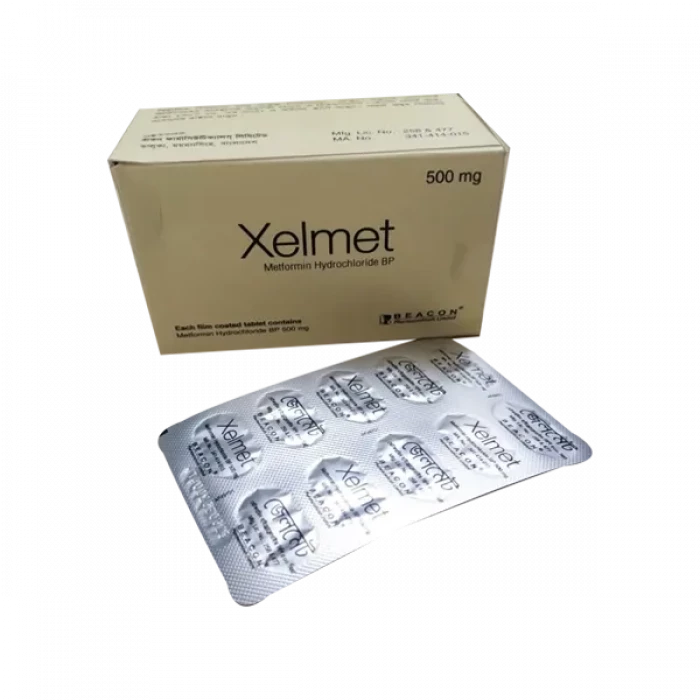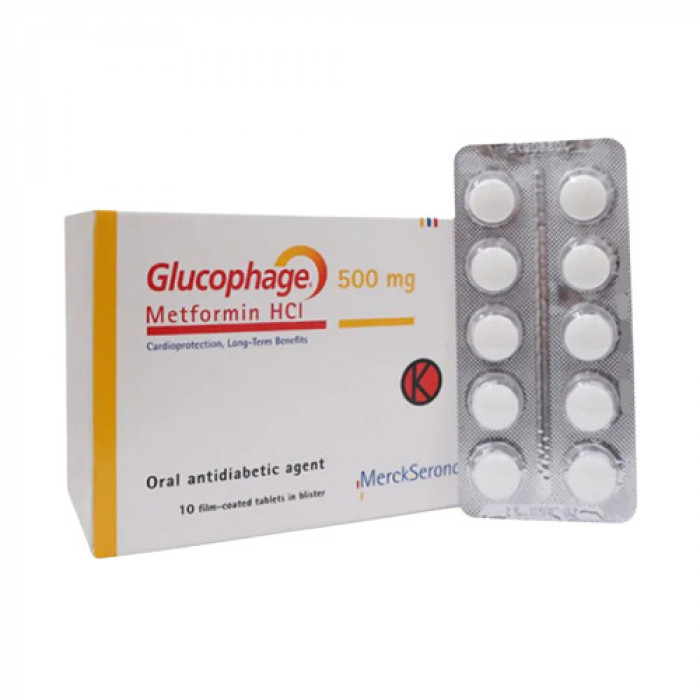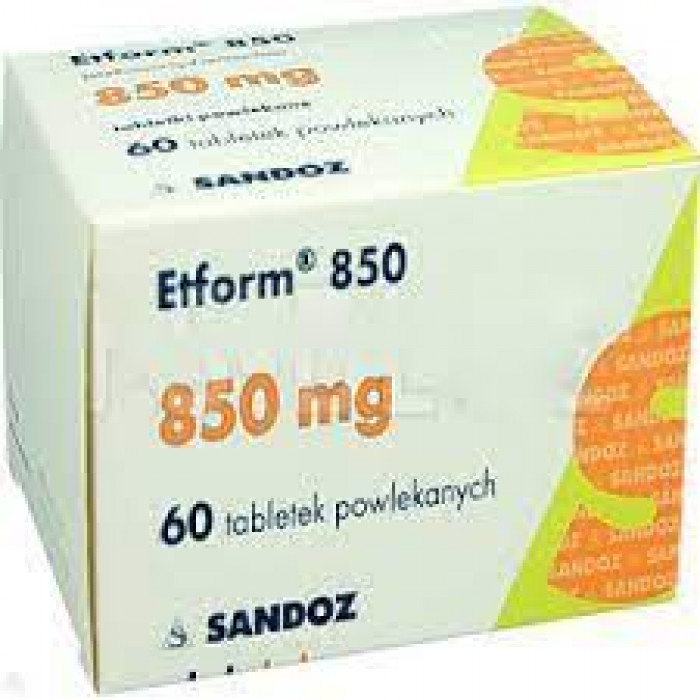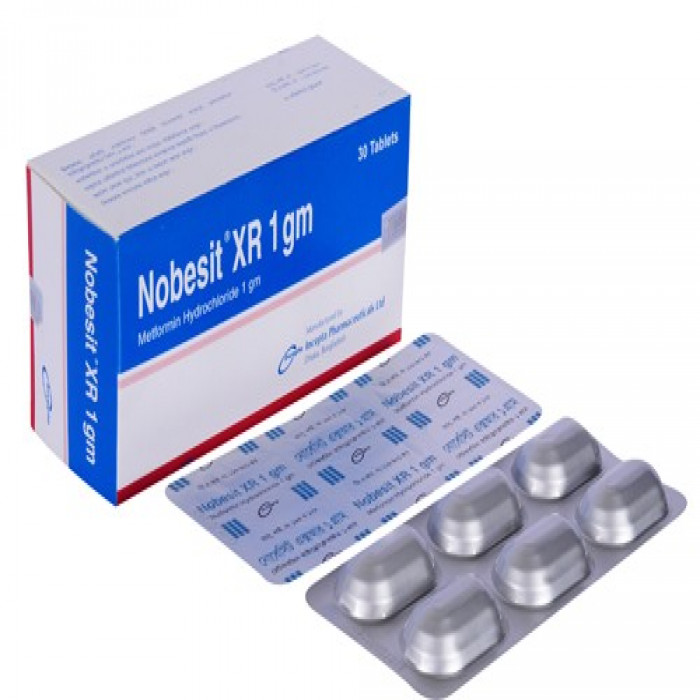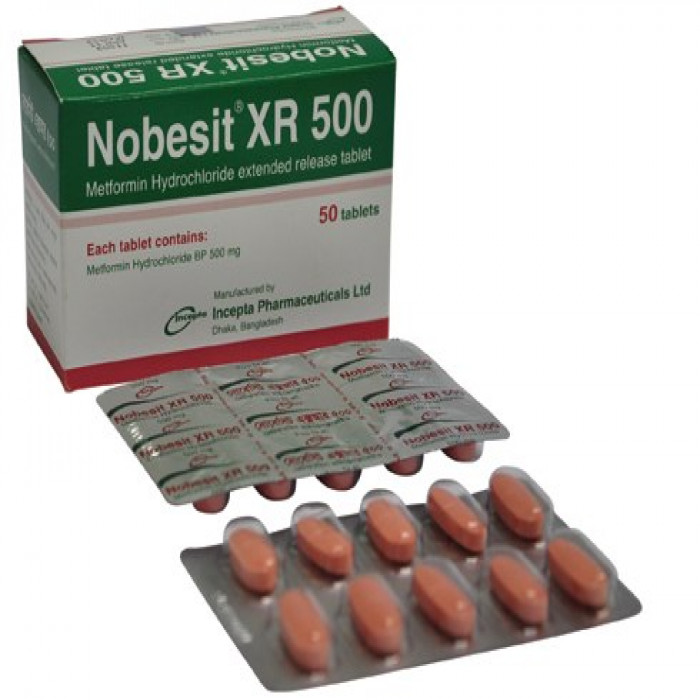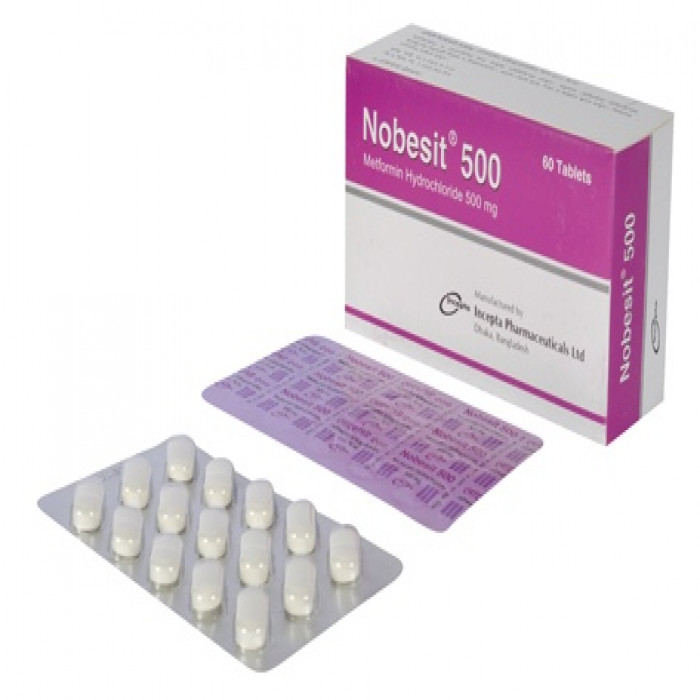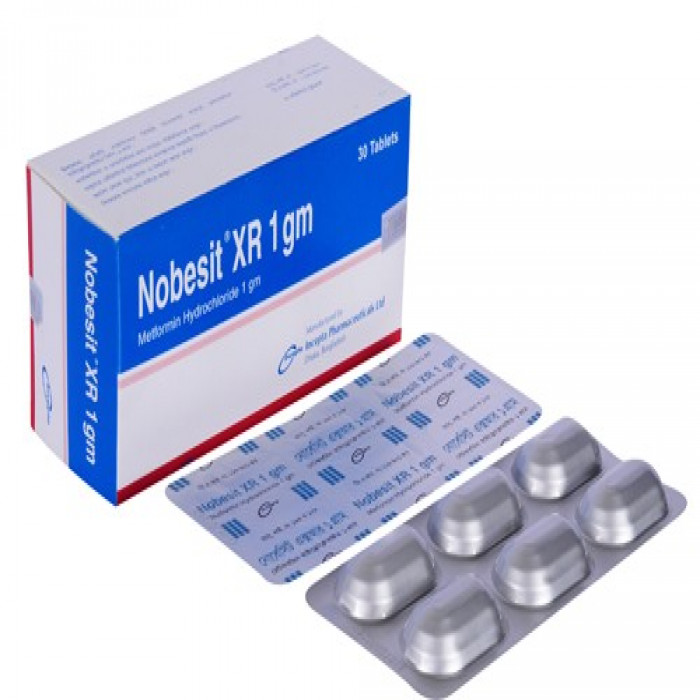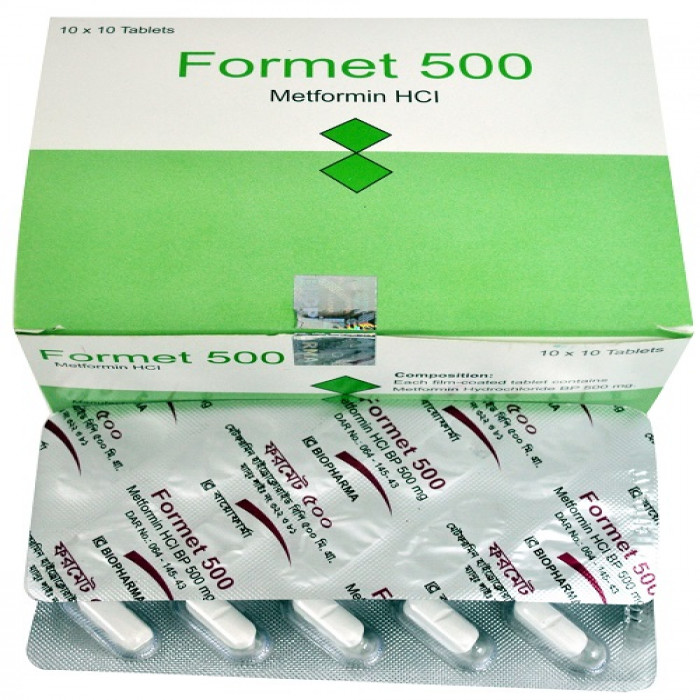
✔ 100% Authentic Product
👁️ Currently Viewing 2396
Metformin belongs to the biguanide class of oral antidiabetic agents. It effectively lowers both fasting and postprandial blood glucose without causing hypoglycemia.
Its main mechanisms include:
- Suppression of hepatic glucose production
- Decreased intestinal absorption of glucose
- Improved insulin sensitivity through enhanced peripheral glucose uptake and utilization
Metformin overdose (even at doses up to 85 g) usually does not cause hypoglycemia but may result in lactic acidosis, a medical emergency requiring hospital treatment and hemodialysis for drug removal.
Discount
Price: ৳ 39
MRP:
৳
40
2%
Off

100% Genuine Products, Guaranteed

Safe & Secure Payments, Always

Fast, Secure & Efficient Delivery

Proper Packaging
 Cash on Delivery - All over Bangladesh
Cash on Delivery - All over Bangladesh Regular Delivery - 12-24 Hours, Dhaka City* Charge Tk.39-59
Regular Delivery - 12-24 Hours, Dhaka City* Charge Tk.39-59 Regular Delivery - 24-48 Hours, Other Cities* Charge Tk.99-110
Regular Delivery - 24-48 Hours, Other Cities* Charge Tk.99-110
🌙 রমযান অফার 🌙
 ফ্রি ডেলিভারিঃ - ৭৯৯ টাকা+ অর্ডারে, ঢাকা
শহরে
ফ্রি ডেলিভারিঃ - ৭৯৯ টাকা+ অর্ডারে, ঢাকা
শহরে ফ্রি ডেলিভারিঃ - ২৭৯৯ টাকা+ অর্ডারে, ঢাকার
বাহিরে
ফ্রি ডেলিভারিঃ - ২৭৯৯ টাকা+ অর্ডারে, ঢাকার
বাহিরে
📲 মোবাইল অ্যাপ অর্ডারে সাশ্রয় বেশী
-
Google Play Store থেকে ডাউনলোড
-
Apple Store থেকে ডাউনলোড
100% Genuine Products, Guaranteed
Safe & Secure Payments, Always
Fast, Secure & Efficient Delivery
Proper Packaging
 Cash on Delivery - All over Bangladesh
Cash on Delivery - All over Bangladesh Regular Delivery - 12-24 Hours, Dhaka City* Charge Tk.39-59
Regular Delivery - 12-24 Hours, Dhaka City* Charge Tk.39-59 Regular Delivery - 24-48 Hours, Other Cities* Charge Tk.99-110
Regular Delivery - 24-48 Hours, Other Cities* Charge Tk.99-110 ফ্রি ডেলিভারিঃ - ৭৯৯ টাকা+ অর্ডারে, ঢাকা
শহরে
ফ্রি ডেলিভারিঃ - ৭৯৯ টাকা+ অর্ডারে, ঢাকা
শহরে ফ্রি ডেলিভারিঃ - ২৭৯৯ টাকা+ অর্ডারে, ঢাকার
বাহিরে
ফ্রি ডেলিভারিঃ - ২৭৯৯ টাকা+ অর্ডারে, ঢাকার
বাহিরে- Google Play Store থেকে ডাউনলোড
- Apple Store থেকে ডাউনলোড
🌙 রমযান অফার 🌙
📲 মোবাইল অ্যাপ অর্ডারে সাশ্রয় বেশী
✅ Description:
Formet is indicated for the management of Type 2 Diabetes Mellitus, particularly in overweight adults when diet and exercise alone are insufficient to achieve optimal glycemic control.
Adults: Can be used as monotherapy or in combination with other oral antidiabetic agents or insulin.
Children (10 years and above) and adolescents: May be used alone or in combination with insulin.
Clinical studies show that metformin, as first-line therapy in overweight adults, helps reduce diabetic complications following dietary failure.
Use only as directed by a registered physician.
✔️ Dosage & Administration | Formet 500
Metformin Immediate Release (IR):
- Adults: Start with 500 mg twice daily or 850 mg once daily with meals. Gradually increase by 500 mg weekly or 850 mg every two weeks up to 2000 mg/day, divided into doses. If additional glycemic control is required, doses up to 2550 mg/day may be used.
- Children (≥10 years): Begin with 500 mg twice daily with meals; increase by 500 mg weekly to a maximum of 2000 mg/day, divided into doses.
Metformin Extended Release (XR):
- Adults: Start with 500 mg once daily with the evening meal. Gradually increase by 500 mg weekly up to 2000 mg once daily or 1000 mg twice daily. Swallow tablets whole—do not crush or chew.
- Children: XR formulation not recommended.
Renal Impairment:
Contraindicated if eGFR <30 mL/min/1.73 m².
Assess risk/benefit if eGFR <45 mL/min/1.73 m².
- Elderly: Adjust dose based on renal function; monitor frequently.
- Children (10–12 years): Prescribe with caution; closely monitor growth and puberty.
- Renal impairment: Assess GFR regularly — at least annually for normal function, and 2–4 times yearly for borderline or elderly patients.
✔️ Side Effects | Formet 500
Very Common: Gastrointestinal disturbances such as nausea, vomiting, diarrhea, abdominal discomfort, and loss of appetite (often transient and self-resolving).
Common: Taste disturbances.
Very Rare: Lactic acidosis, decreased Vitamin B12 absorption (may cause megaloblastic anemia), hepatic dysfunction, and skin reactions like erythema or urticaria.
Not Known: Encephalopathy, hemolytic anemia.
Gradual dose escalation and taking the medicine with meals help improve gastrointestinal tolerance.
✔️ Interactions
Enhanced absorption: Nifedipine may increase metformin absorption.
Renal competition: Cationic drugs (e.g., Digoxin, Morphine, Quinidine, Trimethoprim, Vancomycin) may compete for renal tubular secretion, potentially increasing plasma metformin levels.
Hyperglycemic agents: Drugs such as corticosteroids, diuretics, oral contraceptives, thyroid hormones, and calcium channel blockers may reduce glycemic control.
Cimetidine: May increase metformin concentration; use with caution.
✔️ Contraindications
- Hypersensitivity to metformin or any of its components
- Acute metabolic acidosis (e.g., lactic acidosis, diabetic ketoacidosis)
- Severe renal impairment (eGFR <30 mL/min/1.73 m²)
- Conditions predisposing to hypoxia: cardiac or respiratory failure, recent myocardial infarction, shock
- Severe hepatic insufficiency or chronic alcoholism
✔️ Pregnancy & Lactation
Pregnancy: Uncontrolled diabetes during pregnancy increases the risk of congenital defects and perinatal mortality. Insulin is preferred during pregnancy for optimal glucose control.
Lactation: Metformin is excreted in breast milk in small amounts. Although no adverse effects have been reported in infants, breastfeeding is generally not recommended during metformin therapy unless the benefits outweigh the potential risks.
✔️ Precautions & Warnings
- Renal monitoring: Regularly assess kidney function; discontinue if renal function declines.
- Vitamin B12 deficiency: Long-term use may lower Vitamin B12 levels; monitor annually.
- Surgery and investigations: Stop metformin 2–3 days before major surgery or radiological procedures involving iodinated contrast.
- Dehydration or infection: Avoid use during severe infection, dehydration, or trauma.
- Combination therapy: When used with insulin or sulfonylureas, monitor for hypoglycemia.
✔️ Storage:
Store below 30°C, protected from light and moisture.
Keep out of reach of children.
⚠️Disclaimer:
At ePharma, we’re committed to providing accurate and accessible health information. However, all content is intended for informational purposes only and should not replace medical advice from a qualified physician. Please consult your healthcare provider for personalized guidance. We aim to support, not substitute, the doctor-patient relationship.





